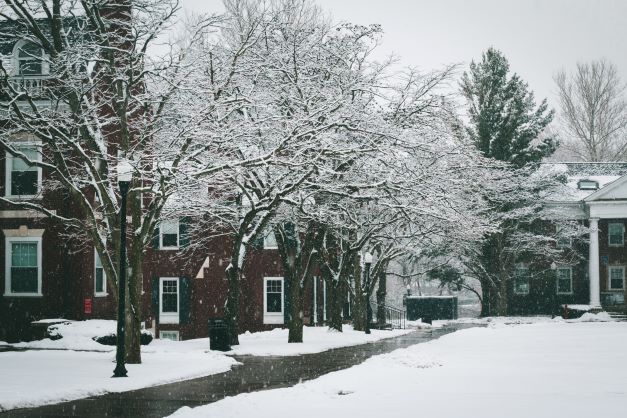Building a College List: Factors to Consider

Building a college list is the start of determining if a school is a suitable match for you. Creating the list requires research, research, and more research.
You may already be thinking of many of the factors below, but probably not all. Use this list as you move through your due diligence in building your college list.
Academic Difficulty Level
Ask how rigorous you want your college classes to be in comparison to your high school curriculum.
- Valued by ambitious students who want to be challenged
- Important to social students who are concerned about school/life balance
- Students who have lower academic self-confidence
Campus Beauty
Remember, beauty is in the eye of the beholder!
The best way to know if you find a campus beautiful is to visit. Beauty is only one component of the attractiveness of a college, but for many students, it’s an essential factor.
Career Placement
Moving directly from the college campus to the workforce is increasingly vital as the economy changes.
The career placement office is one of the most valuable and under-utilized resources on college campuses. They can help students with resumes, interview preparation, internships, and career guidance. At some colleges, they’ll also hold job fairs and be the point of contact for co-ops.
Class Size
Some students prefer smaller, discussion-based classes where it’s easier to develop relationships with the instructor and fellow students.
Clubs and Organizations
Clubs and organizations can provide a valuable outlet for recreational activities, meeting new friends, or exploring academic and professional goals outside the classroom. Examples include:
- Sororities and fraternities
- Spiritual organizations
- Race or gender-based affinity groups
- Community service organizations
- Entrepreneurial organizations
- Intramural sports
- Art and music clubs
- Wellness and physical fitness clubs.
College Size
The sizes of colleges generally fall into the below size categories.
- Small: fewer than 3,000 students
- Midsize: 3,000-12,000
- Large: 12,000-25,000
- Mega: 25,000+
Other factors to take into consideration when looking at the size of the campus are:
- How many undergraduates vs. graduate students
- How many students live on campus vs. commute
Cost
For most families, the cost will be a significant factor, if not the most significant factor, in determining to include a school on a college list.
Discussions about what the family can afford, if savings are allocated for college, and if loans are an option should happen early in the college list-building process.
Course Offerings
- Does a school offer online or hybrid classes?
- Are you able to take classes at sister institutions, or is the college part of a consortium?
Curricular Approach
Does the school have a core curriculum with required courses outside your primary area of study? Colleges with core curricula include Columbia University and The University of Chicago.
Other schools will have an open curriculum allowing for more flexibility. Brown University, Amherst College, and Grinnell all follow this model.
Distance from Home
Parents usually feel that schools are too far away from home, while students may think that schools are too close. Some factors when looking at how far away schools are from home are:
- Travel costs, including airline or train tickets, fuel costs, hotel, and parking
- Out-of-state tuition at public universities and colleges
- Distance from a student’s support system, how easy it is to visit for activities or if a student should become ill
Diversity
Do you want fellow students to look and think like you? Or do you want to get to know people with experiences that are different from yours? Think about:
- Race and ethnicity
- International students
- Cultural perspectives
- Socio-economic diversity
- Sexual orientation
- Political perspectives
- Religious views.
Experiential Education
This refers to learning by doing. It includes opportunities like study abroad, study away, internships, co-ops, research, teaching, volunteering, leadership, and mentoring opportunities.
Facilities
The facilities students usually care about most are the dorms, followed by dining halls. No surprises here.
Other facilities are libraries, athletic facilities, student centers, and theaters.
Food
This is a huge factor for students. See if there are several options because, depending on the campus, you may eat most of your meals in the dining hall.
If you have special dietary needs, talk with the schools to see how they can accommodate your situation.
Friendliness
You won’t be able to determine the friendliness of campus until you visit. Then you’ll know it when you feel comfortable among the students, faculty, and staff. Large campuses can also have a friendly feel while still providing a sense of anonymity that some students prefer.
Graduation Rate
This factor is gaining importance with it being a data point in government and college rankings. Students and parents are more interested in the four-year graduation rate, but some majors commonly extend to five years. Engineering is one of the more common examples, and if students participate in co-ops, they may take longer than four years to complete a degree.
Below are resources to research graduation rate information:
Historically Black Colleges and Universities (HBCUs)
There are 107 private and public HBCUs, and most are in the South. Students of all races make up the student body and reflect geographic, gender, socio-economic and international diversity. Students may select an HBCIU for some of the following reasons:
- A desire to be at a school designed with them in mind
- Seeing professors who look like you can be inspiring and empowering
- Students may find an almost all-black student body to be lacking in racial diversity
Influencers
This isn’t a reference to social media influencers, although they can probably sway prospective students. This refers to people in the student’s life who may have some influence or want to have some impact on college choices. This can be parents, grandparents, or anyone whose opinion the student holds in high regard.
Instructor Quality & Access
Students can now read crowdsourced reviews of professors on Rate My Professors. Many institutions also have instructor reviews available on their websites.
Access to instructors will be necessary for students that prefer discussion-based vs. lecture-based course models. Using the average class size can act as a surrogate for the accessibility of instructors.
Location
When considering the location of your future school, you’ll live there for four years and should enjoy the site and the surrounding community. However, it is only four years.
Factors to consider about a preferred location:
- What kind of weather do you prefer?
- Do you need to be close to the beaches, mountains, an international airport, or a large city?
- Are you close to family or a support system?
- Is there an airport or train station nearby for easy trips home?
Prestige & Name Recognition
This is the most significant factor for many students and their families. It’s ok to consider the name recognition of schools when building a college list provided, they’re all a good fit for the student, and the list has a variety of schools.
There is also regional prestige, meaning local colleges have better name recognition and will be better respected than national institutions.
On-Campus vs. Off-Campus Living
As students learn more about how a residential experience differs from a commuter campus, they tend to value the distinction more.
Also, consider if a school requires students to live on campus for some time. It’s not uncommon for colleges to require students to live on campus for at least the first year.
Some schools will guarantee on-campus housing for all four years. This is a significant benefit when the school is in an expensive locale.
Religious Affiliation
If you want to be surrounded by students and faculty who share your views from a religious perspective, you’ll want to prioritize schools that reflect your values.
Not all schools with a religious affiliation are overtly religious and welcome students of all faith.
Research Opportunities
Undergraduate research opportunities aren’t a significant consideration for most students unless they’re looking at graduate school. Institutions that offer undergraduate opportunities will highlight this fact on their websites.
Safety & Security
This is a significant factor for students but is usually a bigger issue for parents.
Two resources, in addition to a school’s website, are City-Data and College Transitions.
School Spirit
School spirit doesn’t just mean tailgating and socializing before the Saturday football game. It can also mean being surrounded by students proud to attend the college.
Single-Gender vs. Coed
They’re not for everyone. But before you rule out single-gender schools, know they partner with coed schools for social events. Women can more easily find leadership opportunities.
Social & Political Culture
This category can encompass many different factors. Specific points to consider:
- Political climate and activism on a campus
- Perspectives of the faculty
- Social rules
- “Party school” atmosphere
Sports & Performing Arts
This is important for students who perform at the highest level. Consider at what level you want to participate. Will you be a recruited quarterback, or are intramural sports more likely?
Most colleges have ample opportunities for students to partake in athletics and the performing arts at multiple skill levels.
Strength in Your Major
Not all majors are offered at all colleges. For instance, if you’re interested in aerospace engineering, you will weigh schools that offer a major in that field more heavily than schools with only a minor or concentration.
Student Support
This is another factor that parents focus on more than students. Samples of student support services to look for:
- Availability of tutoring
- Mental health counseling
- Educational seminars and workshops
- Writing support
- Living & learning communities with an opportunity to live with students who share a common interest
- Affinity groups that support students of color, LGBTQ+ students, international students
- Disability services
- Support for first-generation students





